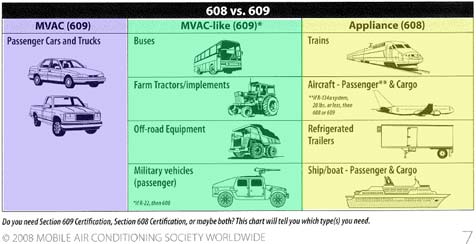Two different certifications Section 608 and Section 609
Did you know today, Tuesday, September 14, 2010 is the 40th anniversary of the United States Clean Air Act? Section 608 and Section 609 which regulate stationary and mobile air conditioning system service stem from that historic environmental regulation.
What do section 608 and 609 regulate?
Section 608 of the Clean Air Act directs the EPA to establish requirements to prevent the release of ozone-depleting and certain other refrigerants during the servicing, repair or disposal of appliances and industrial process refrigeration systems. This includes the scrapping/salvage of vehicles that have a mobile A/C system. Section 608 covers procedures involving motor vehicle air conditioners (MVACs) that are not covered by Section 609, such as the disposal of MVACs. Below is information concerning specific areas where the overlap between these two sets of regulations may require clarification.
Section 609 of the Clean Air Act establishes standards specifically for the service of MVACs. MVACs are included in the definition of appliances under the stipulations put forth in Section 608; however, since their service and repair are regulated under Section 609, they are not subject to the servicing requirements put forth in Section 608.
Both regulations require that technicians become certified. Technicians who repair or service MVACs must be trained and certified by an EPA-approved Section 609 program.
These programs are specifically designed to cover MVAC refrigerant recovery, recycling and charging equipment and procedures in accordance with SAE Standards and Section 609 regulatory requirements. After completing a required training program, MVAC technicians must pass a test to become certified.
These tests are different from the Section 608 certification tests. Under Section 608, the EPA has established four types of certification for technicians that service and repair appliances other than MVACs. To be certified, technicians must pass a test for the appropriate appliances. All training and review classes for Section 608 are voluntary; only passing the test is mandatory. The four categories of certification are:
Type I: Small appliances
Type II: High-pressure appliances, except small appliances & MVACs
Type III: Low-pressure appliances
Type IV (Universal): All appliances except MVACs
People who service or repair MVAC-like appliances (e.g. farm equipment and other off-road vehicles) can choose to be certified by either the Section 609 program or under Section 608 Type II. However, due to the similarities between MVAC and MVAC-like appliances, the EPA recommends that technicians servicing MVAC-like appliances consider certification under Section 609.
Note: While buses using CFC-12 are MVACs, buses and other vehicles using HCFC-22 as refrigerant are not classified as MVACs or MVAC-like appliances, but rather as high-pressure equipment covered under
Type II of the Section 608test. Certification under Section 608 is also required to service cargo refrigeration equipment.
When having your mobile A/C system professionally serviced, insist on proper repair procedures and quality replacement parts. Insist on recovery and recycling so that refrigerant can be reused and not released into the atmosphere.
You can E-mail us at macsworldwide@macsw.org or visit http://bit.ly/cf7az8 to find a Mobile Air Conditioning Society repair shop in your area. Visit http://bit.ly/9FxwTh to find out more about your car’s mobile A/C and engine cooling system. MACS is an EPA approved provider of Section 609 certification only.


Leave a Reply